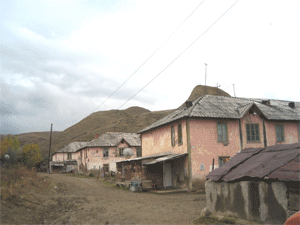 If you were to visit the “Town of Miners” settlement, you might think that bombing occurred only a few days ago. It is four kilometers away from the village of Skhvilisi, situated on the right side of the central motorway to Vale..
If you were to visit the “Town of Miners” settlement, you might think that bombing occurred only a few days ago. It is four kilometers away from the village of Skhvilisi, situated on the right side of the central motorway to Vale..
The settlement is in ruins. The stone factory at the town’s entrance has been destroyed and huge, rusty, broken machines stand as reminders that at some point before, life was going at full speed here. Rainy days like the one the HRIDC experienced when they visited the town make the impression all the more bitter.
Long before, a road ran through here. Now, however, not a piece of asphalt is in sight. Almost all the three-story wooden houses built for the miners are falling down.
“The first, second and third mines used to work,” said Petre Khitarishvili, a local resident. “The whole of Vale was employed in them. A tram operated here, as well as factories where iron was cut and wood was sawed. Earrings and ashtrays were made there. Oxianid, a kind of stone, was imported from the Tsalka district and was used to make various souvenirs. We had a post office, a hospital, and a service office for rescue operations in the mines, if needed.”
That nice life ended a long time ago. Local people now complain about poverty, starvation and mass unemployment.
“Before 1983-87, when the mines were closed down, I was a repairman and a trench cleaner. After the collapse of the Communist regime, I took part in repair operations in the Tsitsamuri Water Tunnel, in Armenia after the earthquake and Sochi as well. For the last three years, I worked at the Vale Fire Department. But they cut back on personnel, saying Vale did not need a fire brigade at all,” said Petre Khitarishvili.
The “Town of Miners” does not receive many visitors, so many people came to meet with the HRIDC when we visited and tell us of their problems.
“If a fire were to start in the settlement, every building would burn down,” said sixty-seven year-old Rafik Ghrmjiani. “We cannot use fire wood in winter because it is too dangerous. We have lived in these wooden houses for 60 years and soon all of them will be falling down. We needed to climb three steps to get into this house when it was first built, but now all the stairs are in the ground,”
Forty-four-year-old Petre Khitarishvili has three children. Nobody works in his family.
“My wife is an accountant but she has not worked in a long time,” Khistarishvili said. “I received only 17 lari a month the three years I worked at the Fire Department. Now we have started to work in the mine illegally. They might come and detain us but prison will not be worse than this place, believe me. I deliver coal to houses. We give it to poor people for free and sell part of it too. What else can we do?”
The mines have been closed for more than ten years. Five men still work in the abandoned mines. They say that it is dangerous for them to go inside each day.
“We risk death each time we enter the cave, but you can die anywhere, even at home,” said a former miner. Those who still work in the mines walk 510 meters down into the pit.
“We are afraid to walk down there. We are never sure if we will leave alive,” they said. They continue the dangerous work because they cannot see another way out.
“What shall we do?” Khistarishvili asked. “In the past I earned my salary according to the amount of time I worked in a day. I worked 21 hours a month and sometimes I even earned 700 lari. In additon, we were given allowances for furniture and carpets and even received free tickets for vacations. Now, I mine almost two tones of coal a day with my bare hands a pick.”
The work was always hard, but they used to have good times, too.
“In the past, we had special hammers, transport and conveyors,” Khistarishvili continued “I personally used to cut almost 50-60 tones of coal within six hours. There used to be an electric train to move the coal out, but now we push wagons to carry out the coal.”
The miners want a license.
“Officials from Environmental Department often visit us,” Khistarishvili said. “Sometimes we hide from them and just won’t come out of the pit. We wanted to get a license to mine, but they told us we couldn’t afford it. So we just work without sanction.”
The locals reported that the miners were fined with two thousand lari for illegally working in the pit.
Resident Givi Frtskialadze explained that officials from the Environmental Department prohibit them from pulling the broken tree branches from the river. “The water is carrying those branches and they say we cannot touch them. But, tell me, what should people do? Should we freeze in winter? Nobody works here and who can pay 700 lari for the firewood? It’s to dangerous to burn firewood in our houses anyway.”
Poverty looks out through the plastic bag covered windows of the wooden houses in the Town of Miners. People here have given up hope that their lives life will ever change for better.
Gulo Kokhodze, Vale



